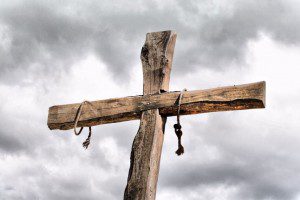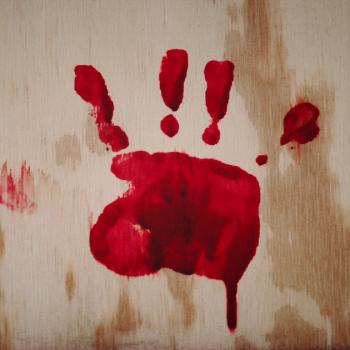
In Luke’s account of the crucifixion, he records something shocking that Jesus said on the cross. As Jesus hung there, slowly dying, He watched the soldiers cast lots to see who got his clothes; pretty much everybody besides His mother was mocking Him. And in the midst of their cruelty, and all of His agony, Jesus says, “Father, forgive them, for they know not what they do.”
C.S. Lewis once wrote: “Everyone says forgiveness is a lovely idea, until they have something to forgive.” That’s true isn’t it? Forgiveness sounds lovely until someone cuts you off in traffic, and then forgiveness seems like option F on a multiple choice question with options A-D. And CS Lewis wasn’t just being clever. In a letter near the end of his life, he commented that he had finally forgiven a cruel schoolteacher who had darkened his childhood when he was a young boarding student. Over 40 years of holding on to pain & bitterness.
On the cross, we see a man who didn’t let time pass. He didn’t hold a grudge. Jesus was pleading for God the Father to forgive those who had put Him to death and who were mocking Him.
But, I’ve always thought that the second half of Jesus’ request was an odd statement. What did Jesus mean when he said: “For they know not what they do”? It seems like they knew exactly what they were doing. The Jewish religious leaders had plotted for three years to kill him. They bribed Judas to betray him. People in the crowd knew what they were doing. Jesus had healed their sick and fed them bread and fish. But they shouted for him to be crucified. They knew what Roman crucifixion meant for a man. And Pontius Pilate knew what he was doing. He knew he was executing an innocent man to maintain his office. That’s why he went through that whole charade about washing his hands.
In what sense did they not know what they were doing?
Indeed, Jesus knew that they were guilty, and He’s not excusing their actions by saying that they didn’t mean to. But, He’s looking at these people from a spiritual perspective. He sees them as people blinded and enslaved by sin. They were willingly enslaved, but enslaved nonetheless. And Jesus doesn’t hate them for that. He has pity on them. He says to his Father, ‘Look at them. They’re blinded by sin. They’re in bondage. They don’t know what they’re doing. Have mercy, Father, forgive them.’
But, His forgiveness was bigger than just the people present that day outside of Jerusalem. The Bible tells us that Jesus died for the sins of the whole world. And not just the world at that time. Jesus was the sacrificial lamb who died for the sins of all people in all times. That includes you and me. When we hear Jesus asking the Father to forgive, He’s asking on our behalf.
And He is the instrument by which God can forgive us. For God to be a just God, evil must be dealt with. It was God who said, “I will surely not let the guilty go unpunished.” We ought to receive the penalty which our moral crimes deserve. But the good news of the gospel is that God laid the penalty for our sins on Jesus. He died so that we could be forgiven.
But, it’s only those who recognize their sin and ask God to forgive them that receive the benefits of Jesus’ death. And some will say, ‘But I’m a pretty good person. I live a good life- what did I ever do to God? Why do I need to be forgiven by Him?’
Tim Keller answers this objection by saying, “Imagine a poor widow with an only son. She teaches him how she wants him to live- to always tell the truth, to work hard, and to help the poor. She makes very little money, but with her meager savings she is able to put him through college. Imagine that when he graduates, he hardly ever speaks to her again. He occasionally sends a Christmas card, but he doesn’t visit her; he won’t answer her phone calls or letters; he doesn’t speak to her. But he lives just like she taught him- honestly, industriously, and charitably. Would we say this was acceptable? Of course not! Wouldn’t we say that by living a ‘good life’ but neglecting a relationship with the one to whom he owed everything he was doing something [terrible]? In the same way, if God created us and we owe him everything and we don’t live for him but we live a ‘good life,’ it’s not enough.”
All the bad things that we do- all the lies we tell, all the gossip and hatred we spew- are ultimately an offense to God Himself. But all the things that we should have done- the worship that we never gave, the love that we never exercised- are also an offense to God. All sin is cosmic treason against the God who made us and is our rightful Lord.
But, the good news is that while God is just, He is also a God of love, who took on the price of our rebellion.
Let’s think for a moment about the cost of forgiveness. Suppose some kids are playing ball in your neighborhood- one puts a baseball through your living room window. He’s in your debt. He owes you for that broken window. You can make him pay—or you can forgive him. If you forgive him, the debt doesn’t disappear. The window still has to be fixed. But you pay for it. You absorb the cost.
Let’s go a step deeper: What if someone hasn’t just broken a window- what if he’s broken something much more precious? What if he’s broken your happiness by his betrayal or cruelty? What if she’s shattered your plans and dreams by her lies? What if he’s hurt your good name, or hurt people you love? When a person wrongs you deeply, he’s in your debt. He owes you. It’s not a monetary debt, but it’s still a real debt. It’s the price of very precious things that often can never be recovered.
But the cost of not forgiving someone is much greater. A pastor I know writes about an encounter he had with a broken man. Even though the man didn’t go to his church, he wanted to talk to him and tell him his story. Three years before, he found out that his wife had been unfaithful to him. He said the night that he confronted his wife, that she walked out on the front porch and he was alone in the house: In that moment a voice in his head said: ‘If you forgive her, your marriage will be saved.’ But he said: ‘I silenced that voice, because I didn’t want to forgive her. I wanted her to pay. I wanted her to feel the same hurt she had done to me.’
For the next three years, even after their divorce, he had tried to make her pay. Whenever he had to deal with her about their children, he would always remind her that she was the one who had wrecked the marriage. She was the one with bad morals. She was the one responsible for their children living in a broken home. And she had two failed romances after their divorce. When he found out about them, he would begin to hope that the relationship would fail and that she would be dumped and hurt. And when that’s exactly what happened, he rejoiced.
But after a while he began to recognize that his hatred for her was making him an angry, bitter man. It was affecting his relationships with other people- his whole outlook on life. So he told himself, ‘I’m just going to forget her, she’s nothing to me. Who cares what she does with her life? I’m not going to think about her anymore.’ But that didn’t work, because these grooves of hatred had worn so deep, he just couldn’t keep his mind from going down those paths.
And he looked at this pastor with tears in his eyes and said: “I hate my ex-wife. My hatred is killing me. How can I forgive her?”
Someone once said that unforgiveness is like eating poison and hoping the other person suffers. Jesus didn’t have to forgive us. He could have held our sins against us and been perfectly just in doing so. But He gave His life so that we could be forgiven. He drank the poison of our sins, and became sin for us, so that we could have a new and perfect relationship with God.
And now we can forgive one another.
What is it that you need to forgive?
For some of us, we have big things to forgive. Things we’ve been holding on to for a long time, or that we plan to hold on to for a long time. Stop drinking the poison, and be free from bitterness. And the way to do that is to realize that anything that’s been done to you is infinitely less than the crimes you’ve committed against God.
So, stand at the foot of the cross and hear Jesus say, “Father, forgive them, for they know not what they do.”













